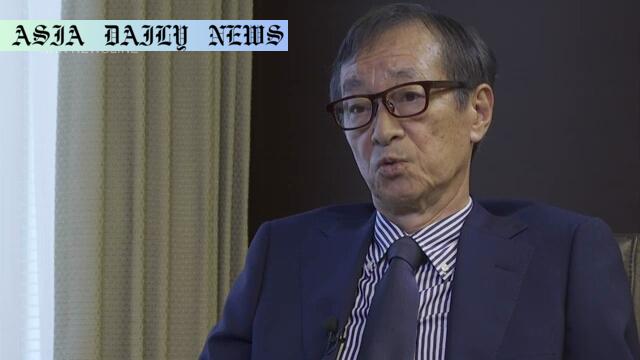Nippon Steel: Chairman Hashimoto discusses evolving US trade policies, highlighting a hands-on governmental approach and Japan’s role.
- Nippon Steel completed a $14.1 billion takeover of US Steel.
- Chairman Hashimoto highlighted the increasing US government involvement in trade policies.
- Japan can play a significant role in reviving US manufacturing.

Nippon Steel’s Acquisition of US Steel Marks a New Chapter
Nippon Steel’s recent acquisition of US Steel for $14.1 billion represents a pivotal change in the world of corporate takeovers and global trade economics. Chairman Hashimoto Eiji’s extensive negotiations, lasting nearly 18 months, culminated in an iconic milestone for the company, which now owns the legendary American institution as a wholly owned subsidiary. The long process of gaining political approval, particularly under the Trump administration, highlights the evolving dynamics of international business dealings and the increasing involvement of governments in major corporate decisions.
What sets this acquisition apart is its larger economic and geopolitical context. Hashimoto noted that even beyond the Trump era, the US is solidifying a trade approach that grants the government greater control over strategic industries and international trade, reflecting its status as a global superpower. Nippon Steel’s deal reflects Japan’s capability to adapt to this shifting landscape and create new avenues for international collaboration while maintaining autonomy.
Japan’s Role in Reviving American Manufacturing
A major aspect of this acquisition is the commitment by Nippon Steel to invest an additional $11 billion in US manufacturing. With the United States emphasizing the revitalization of its industrial foundations, Japan’s expertise in precise and efficient manufacturing systems can aid in alleviating the labor shortages and skill gaps present in the American market. Hashimoto emphasized that this is not merely about following American directives but about Japan finding distinct opportunities amidst these challenges.
The revival of the US manufacturing industry is not just an American ambition but a shared global objective to stabilize supply chains. The symbiotic relationship between Japanese firms like Nippon Steel and American industrial goals could redefine international manufacturing standards, bringing innovations in sustainability and advanced technology to the forefront.
The Shift in Global Trade Policies
Hashimoto observed that the world economy is witnessing a significant transition. Gone are the days when trade was solely dictated by private sector dynamics and market mechanisms. Today, the US government is taking a more active role, dictating significant policies to ensure its trade and industrial strategies align with broader geopolitical objectives. This evolving policy framework underscores the need for global businesses to recalibrate their strategies to align with national aspirations.
By opting for such a hands-on approach, the US appears to be addressing its internal economic disparities while consolidating its influence globally. Nippon Steel’s ability to navigate this diplomatic chessboard offers valuable lessons for multinational corporations eager to succeed in a world where governments increasingly shape markets.
What This Means for the Future
The Nippon Steel-US Steel deal sets a precedent for how Japanese companies can redefine their global strategies. Hashimoto’s emphasis on not simply adhering to US policies but finding spaces for partnership indicates a pragmatic and forward-thinking business philosophy. This collaboration can also encourage other Japanese companies to pursue similar opportunities abroad, particularly in regions requiring industrial revitalization.
Ultimately, this historic acquisition bridges cultural and economic gaps, providing a roadmap for mutually beneficial international cooperation. It signifies how traditional industrial powerhouses can work together in ways that foster growth, technological progress, and newfound economic opportunities, without compromising autonomy.



Commentary
Understanding Nippon Steel’s Bold Vision
Nippon Steel’s acquisition of US Steel is a landmark event in international business, showcasing the company’s confident and strategic vision for growth. Chairman Hashimoto Eiji’s remarks offer profound insights into how Japanese companies perceive the changing dynamics of global trade policy and explore new opportunities amidst economic transformations. The US government’s active involvement in trade relations reflects a broader global trend toward reclaiming industrial sovereignty, and this deal highlights Nippon Steel’s adeptness in navigating such complexities.
Collaboration Over Compliance
A particularly enlightening aspect of this acquisition is Hashimoto’s emphasis on collaboration rather than mere compliance. While the US seeks to bolster its domestic manufacturing capabilities, Nippon Steel sees this as an opportunity to bring Japan’s expertise and high-quality industrial practices to the fore. This collaborative approach underscores a deep understanding of how geopolitical partnerships can function in enhancing global supply chain resilience and ensuring mutual benefits.
The Way Forward
What makes this acquisition even more intriguing is its potential to influence other Japanese companies and their approach to international expansion. Hashimoto’s thought leadership in this regard paints a hopeful picture of an interconnected industrial world where knowledge-sharing and collaborative initiatives redefine success. This strategy also sends a clear message to stakeholders: business in the 21st century is not merely about profits but about creating sustainable growth opportunities that serve both local and global communities.